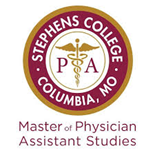Learning Outcomes
 The following competencies will serve as program level student learning outcomes for the Stephens College Physician Assistant Studies program. All course objectives listed in the syllabi are linked to these competencies.
The following competencies will serve as program level student learning outcomes for the Stephens College Physician Assistant Studies program. All course objectives listed in the syllabi are linked to these competencies.
Clinical Reasoning
1.0 Synthesize information about etiologies, risk factors, underlying pathologic processes, and epidemiology for medical conditions to make accurate diagnoses.
1.1 Demonstrate the ability to evaluate, diagnose, and treat patients across the lifespan.
1.2 Construct and evaluate interventions for promotion and maintenance of health.
1.3 Design diagnostic and therapeutic interventions based on patient information and preferences, current scientific evidence and informed clinical judgment.
1.4 Differentiate between the normal and the abnormal in anatomic, physiological, laboratory findings and other diagnostic data.
1.5 Formulate a differential diagnosis from an appropriate history, physical exam findings and diagnostic studies.
1.6 Demonstrate the ability to develop and implement an appropriate therapeutic management plan, either pharmacological or non-pharmacological, based on the patient’s medical history, physical exam and diagnostic study findings.
Interpersonal and Communication Skills
1.7 Document a clinical encounter in the patient record.
1.8 Elicit an accurate medical history from patients.
1.9 Perform a detailed physical exam relevant to the medical history.
2.0 Provide an oral presentation of a clinical encounter.
2.1 Create an educational plan for patients and families.
2.2 Student preparedness for interdisciplinary education.
Professionalism
2.2 Describe the role of the PA including professional, ethical, legal, and regulatory standards regarding the PA profession.
2.3 Demonstrate professional relationships characterized by respect, compassion, accountability, and integrity with patients, families, supervisors, and other members of the health care providers.
2.4 Demonstrate self-reflection to recognize and appropriately address personal biases, gaps in medical knowledge, and limitations in themselves and others.
2.5 Create and sustain a therapeutic and ethically sound relationship with patients.
2.6 Accepts responsibility and follows through on tasks.
Technical Skills
2.7 Demonstrate the ability to obtain informed consent and perform clinical procedures common to primary care to include: venipuncture, intravenous access, wound management, laceration repair, casting and splinting, strep screening, urinary catheterization, arterial lines, central lines, chest tubes, lumbar punctures, thoracentesis, intubation, performing pelvic exams, and interpretation of radiographic images, and ECGs.
Evidence Based Medicine
2.8 Evaluate study designs and statistical methods to appraise clinical literature, diagnostic information and therapeutic effectiveness.
2.9 Utilize information technology to manage information, access medical information, and support their own education.
3.0 Apply principles of evidence-based medicine to clinical scenarios for emergent, acute, and chronic medical conditions across the lifespan.